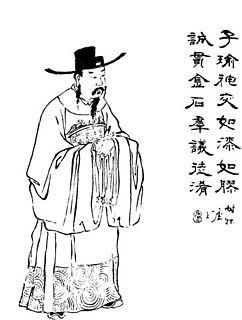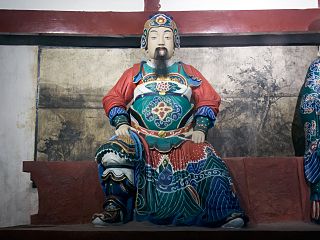
The Battle of Xiaoting, also known as the Battle of Yiling and the Battle of Yiling and Xiaoting, was fought between the state of Shu and the vassal kingdom of Wu between the years 221 and 222 in the early Three Kingdoms period of China. The battle is significant because Wu was able to turn the situation from a series of initial losses into a defensive stalemate, before proceeding to win a decisive victory over Shu. The Wu victory halted the Shu invasion and preceded the death of Liu Bei, Shu's founding emperor.

Zhuge Jin, courtesy name Ziyu, was a military general of the state of Eastern Wu during the Three Kingdoms period of China. Born in the late Eastern Han dynasty, Zhuge Jin started his career in the 200s as an official under the warlord Sun Quan, who later became the founding emperor of Eastern Wu in the Three Kingdoms period. In 215, he served as Sun Quan's representative in a territorial dispute over southern Jing Province between Sun Quan and his ally, Liu Bei. In 219, he joined Sun Quan's general Lü Meng in an invasion of Liu Bei's territories in Jing Province after Sun Quan broke the Sun–Liu alliance. He was subsequently appointed as a general and commandery administrator. Before the Battle of Xiaoting of 221–222, Zhuge Jin attempted to dissuade Liu Bei from going to war with Sun Quan but was unsuccessful. The battle ultimately concluded with victory for Sun Quan's side; both sides made peace later and reestablished an alliance between the Eastern Wu and Shu Han states against their rival state, Cao Wei. From 222 until his death in 241, despite being rather incompetent in military affairs, Zhuge Jin served as one of Eastern Wu's top generals and participated in some battles against Cao Wei forces.

Empress Pan, personal name Pan Shu, was an empress of the state of Eastern Wu during the Three Kingdoms period of China. She was the only empress of Wu's founding emperor, Sun Quan, even though he had a succession of wives before her. She was the mother of Sun Liang, Sun Quan's successor and the second emperor of Wu.
Sun He (224–253), courtesy name Zixiao, was an imperial prince of the state of Eastern Wu during the Three Kingdoms period of China. He was the third son of Sun Quan, the founding emperor of Wu. In 242, he became the crown prince after the death of his brother Sun Deng, the eldest son and first heir apparent of Sun Quan. In the 240s, a power struggle broke out between Sun He and his fourth brother, Sun Ba, over the succession to their father's throne. The conflict ended in 250 when Sun Quan forced Sun Ba to commit suicide, deposed Sun He and replaced him with Sun Liang. In 253, during Sun Liang's reign, the regent Sun Jun reduced Sun He to commoner status and forced him to commit suicide. In 264, one of Sun He's sons, Sun Hao, became the fourth emperor of Eastern Wu. After his coronation, Sun Hao honoured his father with the posthumous title Emperor Wen.
Yan Jun, courtesy name Mancai, was an official of the state of Eastern Wu during the Three Kingdoms period of China.

Deng Zhi, courtesy name Bomiao, was a government official, diplomat and military general of the state of Shu Han during the Three Kingdoms period of China. A descendant of Deng Yu, Deng Zhi started his career in the late Eastern Han dynasty under the warlord Liu Bei as a low-level officer in Pi County. After Liu Bei discovered his talent, Deng Zhi steadily rose through the ranks to become a county prefect and later a commandery administrator and imperial secretary. In 223, the Shu regent Zhuge Liang sent him as Shu's envoy to meet Sun Quan, the ruler of Shu's ally state Wu, and reestablish the Wu–Shu alliance against their common rival state Wei. Deng Zhi succeeded in his mission and earned praise from Sun Quan for strengthening Wu–Shu ties. In 227, Deng Zhi became a military general and he participated in the first Shu invasion of Wei by leading a decoy force with Zhao Yun to distract the Wei general Cao Zhen. Although they lost the battle, Deng Zhi and Zhao Yun managed to rally their troops to put up a firm defence during their retreat and minimise their losses. Following Zhuge Liang's death in 234, Deng Zhi rose to higher general ranks and was stationed in present-day Chongqing for about 10 years before he was recalled back to the Shu capital Chengdu in his 70s to serve as General of Chariots and Cavalry. In 248, he suppressed a rebellion in Fuling. He died in 251.
Liao Li, courtesy name Gongyuan, was an official of the state of Shu Han during the Three Kingdoms period of China.
Gu Tan, courtesy name Zimo, was an official of the state of Eastern Wu during the Three Kingdoms period of China.
Zhu Ju (194–250), courtesy name Zifan, was an official and military general of the state of Eastern Wu during the Three Kingdoms period of China. A son-in-law of Wu's founding emperor Sun Quan, Zhu Ju served briefly as the fifth Imperial Chancellor of Wu from 249 to 250.
Bu Zhi, courtesy name Zishan, was an official and military general of the state of Eastern Wu during the Three Kingdoms period of China. Originally a scholar of humble background, he became a subordinate of the warlord Sun Quan in the late Eastern Han dynasty and gradually rose through the ranks. Between 210 and 220, he served as the governor of the remote and restive Jiao Province in southern China. During the Battle of Xiaoting/Yiling of 221–222, he quelled local uprisings in Sun Quan's territories in southern Jing Province and maintained peace in the area. After Sun Quan became emperor in 229, Bu Zhi oversaw the Wu armed forces guarding the Wu–Shu border at Xiling for about 20 years. During this time, he also gave advice to Sun Quan's first heir apparent, Sun Deng, and spoke up for officials affected by Lü Yi's abuses of power. In 246, he became the fourth Imperial Chancellor of Wu, but died in office in the following year.
Zong Yu, courtesy name Deyan, was a military general and diplomat of the state of Shu Han during the Three Kingdoms period of China.
This article contains the family trees of members of the Sun clan, who ruled the state of Eastern Wu (229–280) in the Three Kingdoms period (220–280) in China.
This article contains the family trees of members of the Liu clan, who ruled the state of Shu Han (221-263) in the Three Kingdoms period (220-280) in China. They were related to the House of Liu, the imperial clan of the Han dynasty.
Sun Fen, courtesy name Ziyang, was an imperial prince of the state of Eastern Wu during the Three Kingdoms period of China. He was the fifth son of Sun Quan, the founding emperor of Eastern Wu.
Sun Ba, courtesy name Ziwei, was an imperial prince of the state of Eastern Wu during the Three Kingdoms period of China. He was the fourth son of Sun Quan, the founding emperor of Eastern Wu.
Sun Luyu, courtesy name Xiaohu, was an imperial princess of the state of Eastern Wu during the Three Kingdoms period of China. She was the younger daughter of Sun Quan, the founding emperor of Wu, and his concubine Bu Lianshi. She is also referred to as Princess Zhu (朱公主/朱主) because of her marriage to Zhu Ju.
Zhuge Rong, courtesy name Shuchang, was a military general of the state of Eastern Wu during the Three Kingdoms period of China. He was the third son of Zhuge Jin, a military general who served under Wu's founding emperor Sun Quan, and a younger brother of Zhuge Ke, a military general who briefly served as regent for Sun Quan's successor, Sun Liang.
Yang Xi, courtesy name Wenran, was an official of the state of Shu Han during the Three Kingdoms period of China. He is best known for writing the Ji Han Fuchen Zan, a collection of praises of notable persons who served in the Shu Han state. Chen Shou, the third-century historian who wrote the Records of the Three Kingdoms (Sanguozhi), extensively quoted and annotated Yang Xi's collection.
Chen Shou (233–297), courtesy name Chengzuo, was an official and writer who lived during the Three Kingdoms period and Jin dynasty of China. He started his career as an official in the state of Shu during the Three Kingdoms era but was demoted and sent out of the capital for his refusal to fawn on Huang Hao, an influential court eunuch in Shu in its twilight years. After the fall of Shu in 263, Chen Shou's career entered a period of stagnation before Zhang Hua recommended him to serve in the Jin government. He held mainly scribal and secretarial positions under the Jin government before dying from illness in 297. He had over 200 writings – about 30 of which he co-wrote with his relatives – attributed to him.

The Records of the Three Kingdoms is a Chinese historical text which covers the history of the late Eastern Han dynasty and the Three Kingdoms period. The primary body of the text was written by Chen Shou in the third century and combines the smaller histories of Cao Wei, Shu Han and Eastern Wu into a single text.
Pei Songzhi (372–451), courtesy name Shiqi, was a historian and government official who lived in the late Eastern Jin dynasty and Liu Song dynasty. His ancestral home was in Wenxi County, Shanxi, but he moved to the Jiangnan region later. He is best known for making annotations to the historical text Records of the Three Kingdoms (Sanguozhi) written by Chen Shou in the third century, providing additional details omitted from the original work. His commentary, completed in 429, became integral to later editions of the Sanguozhi, making the joint work three times as long as the original. Two of his descendants, Pei Yin (裴駰) and Pei Ziye (裴子野), were also well known historians.









